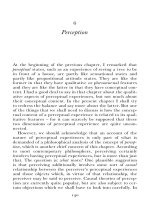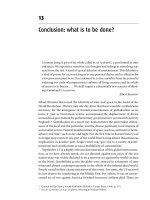Words That Appear to Be Misspellings of Everyday Words II
Bạn đang xem bản rút gọn của tài liệu. Xem và tải ngay bản đầy đủ của tài liệu tại đây (108.18 KB, 12 trang )
A
ll I really need to know about languages, I learned from
Scrabble. For example, a w is worth ten points in French Scrab-
ble; guess there aren’t very many French words with a W in them.
Then there’s the Polish version, in which a z is worth a single
point. In German Scrabble, the rules once required players to pick
up eight tiles instead of the usual seven. Can we guess which lan-
guage has the longest words on average?
On to English Scrabble. There are many ways to improve one’s
score, from learning two-letter words such as aa to memorizing
how many tiles there are in the game for each letter of the alpha-
bet. Another little trick you may want to try some time is to play
words that appear to be misspellings of popular words, a few of
which are provided for you here.
Here’s a quiz: what number, when spelled out, has a Scrabble
score equal to that number? The answer appears at the end of the
book.
40
CHAPTER 10
Words That Appear
to Be Misspellings
of Everyday Words II
cmp01.qxd 7/21/05 12:12 PM Page 40
eagre (EE-guhr)
noun A high tidal wave rushing upstream into an estuary. Also
known as a tidal bore.
Of obscure origin.
● “A few Jet-Skiers attempted to jump over the high waves while
paddlers in longboats tried to outrace the onrushing eagres.”
—New Straits Times (Kuala Lumpur, Malaysia)
imprest (IM-prest)
noun An advance of money, especially to enable one to carry out
some business for a government.
Also, archaic past tense and past participle of impress.
From obsolete imprest (to lend), from Italian imprestare.
● “Golden’s office spent far more, writing $75,842 in imprest
fund checks.”
—New York Newsday
endue (en-DOO, -DYOO) also indue
verb tr. 1. To invest, bestow, or endow with a gift, quality, trait, or
power. 2. To put on (an item of clothing).
WORDS THAT APPEAR TO BE MISSPELLINGS OF EVERYDAY WORDS II
41
The lights of stars that were extinguished ages ago still reach us.
So it is with great men who died centuries ago, but still reach us
with the radiation of their personalities.
—
K
AHLIL
G
IBRAN
, poet and artist (1883 –1931)
Bore No More
When the tidal wave reaches the end of the estuary, does it
become a crashing bore?
—Scott Eldridge, Pinole, California
cmp01.qxd 7/21/05 12:12 PM Page 41
From Middle English enduen (to draw on), from Old French enduire
(to lead in), from Latin inducere (to put on).
What is one thing you’d do if you induce, douche, produce,
subdue, seduce, reduce, or endue? You’d be leading on to some-
thing. The common link here is the Latin root, ducere (to lead). And
what do a noble duke and a lowly duct have in common? The
same—they lead.
● “It’s impossible to believe the style wasn’t meant to serve as a
serene respite from a messy world, to endue the owner with the
same calmness and clearness of mind that its surfaces reflect.”
—Greater Lansing (Mich.) Business Monthly
biennial (bi-EN-ee-uhl)
adjective 1. Happening every two years. 2. Lasting two years. 3.
Taking two years to complete its life cycle.
noun 1. An event occurring once in two years. 2. A plant that
takes two years to complete its life cycle, such as beets and carrots.
From biennium (a two-year period), from Latin bi- (two) + annus
(year).
42
ANOTHER WORD A DAY
Oh, we have a home. We just need a house to put it in.
—
A
N ANONYMOUS CHILD
Cash Dash
Old memories of my government financial career. I oversaw
a $6,000 imprest fund to purchase small items for a research
laboratory environment. Along with the imprest fund came
mock robberies and 12 a.m. phone calls from military police.
The calls required me to drive twenty miles to the military
base, often on icy winter nights, in response to the security
alarm in the locked imprest fund room. These days the credit
card has replaced the imprest fund.
—Colleen A. Fuller, Lowell, Massachusetts
cmp01.qxd 7/21/05 12:12 PM Page 42
● “Europe will defend the biennial event in two years at the K
Club just outside Dublin.”
—The Associated Press
quacksalver (KWAK-sal-vuhr)
noun A quack.
From obsolete Dutch (now kwakzalver), from quack (boast) + salve
(ointment).
Did the quacksalver hawk his concoctions of quicksilver (mer-
cury) as a panacea to earn the name quacksalver? While the con-
nection with quicksilver is enticing, it’s his duck-like behavior
while peddling the snake oil that gave us this colorful synonym for
a charlatan. Imagine someone mounted on a bench, holding vials
of solutions in assorted colors while claiming the potion will cure
everything from chronic backpain to pyorrhea to migraine, and
you’d have a good idea of a quacksalver. In fact, this image is the
source of another term for these pretenders: mountebank. It comes
to us from Italian montimbanco,from montare (to climb) and banco
(bench). In modern times, these hucksters have adapted to use
technology. Today our mailbox might be filled with e-mail mes-
sages hawking products to help us lose weight, enlarge certain body
parts, improve our memory, and cure anything else that ails us.
● “So any quacksalver with a computer and a copy machine can
turn his vegetable stand into a multibillion-zloty chain train of
grocery stores.”
—San Diego Business Journal
WORDS THAT APPEAR TO BE MISSPELLINGS OF EVERYDAY WORDS II
43
To be well informed, one must read quickly a great number of
merely instructive books. To be cultivated, one must read slowly and
with a lingering appreciation the comparatively few books that
have been written by men who lived, thought, and felt with style.
—
A
LDOUS
H
UXLEY
, author (1894–1963)
cmp01.qxd 7/21/05 12:12 PM Page 43
W
hat do a magazine and an albatross have in common with
algebra and a lute? They all come to us from Arabic. As in other
Semitic languages,Arabic words are based on three-consonant roots.
This three-letter structure provides the general concept, and vowels
impart specific meaning. For example, the triplet k-t-b refers to
writing. With the addition of vowels it can morph into kitab (book),
katib (writer, clerk), kutub (books), kataba (he wrote), and so on.
Along the same lines, there is the consonant cluster s-l-m, which
shows up in words indicating ideas of submission, peace, and the
like. Some of the words employing this triplet are Islam (surrender
to God’s will), Muslim (one who submits), and salaam (peace).
Whatever God we follow, may we all know that no God would
condone hurting others. It’s time to look at words from Arabic.
alembic (uh-LEM-bik)
noun 1. An apparatus formerly used in distilling substances. 2.
Something that refines, purifies, or transforms.
From Middle English alambic,from Old French, from Medieval
Latin alembicus,from Arabic al-anbiq,from al (the) + anbiq (still),
from Greek ambix (cup).
44
CHAPTER 11
Words Borrowed
from Arabic
cmp02.qxd 7/21/05 12:14 PM Page 44









